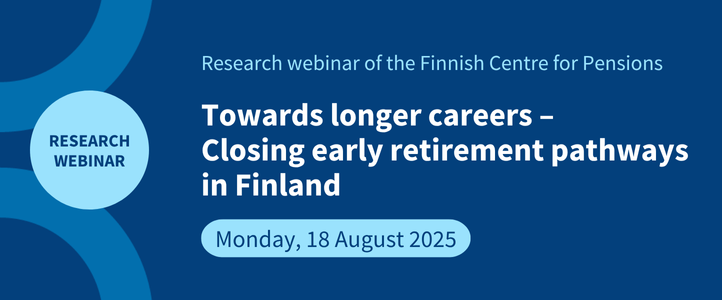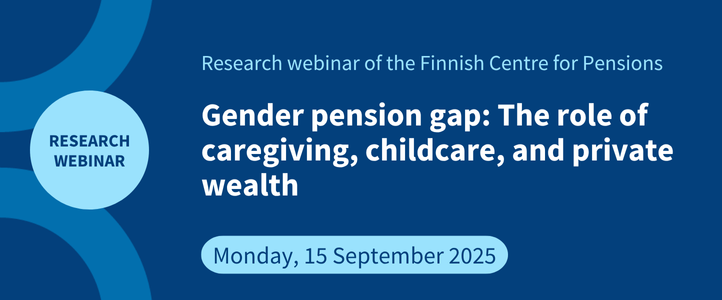Research Seminars
The Finnish Centre for Pensions organizes research seminars, webinars and conferences in both Finnish and English. The seminars focus on most recent research on topics that are relevant for developing the pension system in Finland and abroad. The seminars seek to bring together researchers, policy makers and professionals from pension-related institutions to debate current issues of pensions and pension system development.
All seminars are open access and free. The link to webinars will be sent to all registered participants per email. The materials of the seminars will be sent to registered participants after the event.
Research Webinar: Towards longer careers – Closing early retirement pathways in Finland

Monday, 18 August 2025, 13:00-14:15 CEST (14:00-15:15 local time EEST)
Teams webinar
Since the mid-2000s, Finland has aimed at closing early exit pathways. The webinar of the Finnish Centre for Pensions presents evidence on exit restrictions of two early exit pathways: the Individual Early Retirement Pension (IER) and the extended unemployment benefit (EUB). The webinar is in English.
IER, which was a form of disability pension with relatively lenient eligibility criteria, was abolished in 2004. After that, the only disability-related pathway available was the Ordinary Disability Pension (ODP), which had relatively strict eligibility conditions. However, individuals aged 60–62 were eligible to claim ODP with the same eligibility conditions as IER.
During the webinar, we will learn that ‘relabelling’ an early retirement pathway led to a significant decrease in disability pension application rates. Preliminary results of the effects of raising the EUB eligibility age on various long-term outcomes, including employment, are also presented.
Presentation:
- Ricky Kanabar (University of Bath): Closing early exit routes in Finland: relabelling of individual early retirement pension and increasing age limits of extended unemployment benefit
Comments:
- Tomi Kyyrä (VATT Institute for Economic Research)
Moderator:
- Ilari Ilmakunnas (Finnish Centre for Pensions)
Register for the webinar in Webropol. After registration, you will receive a confirmation and a calendar invitation with the webinar’s Teams link to your e-mail.
Research Webinar 15 September 2025: Gender pension gap: the role of caregiving, childcare, and private wealth

Monday, 15 September 2025, 13:00-14:30 CEST (14:00-15:30 local time EEST)
Teams webinar
Despite ongoing efforts, women’s pensions in the EU remain on average 25% lower than men’s. This gap reflects not only lower average earnings but also more frequent part-time work and longer career breaks among women. The webinar of the Finnish Centre for Pensions presents recent research on how care responsibilities and wealth accumulation shape gender disparities in pensions through case studies from Germany, Finland, and Great Britain. The webinar is in English.
The following questions will be discussed during the webinar: How do childcare credits implemented in the German earnings-related pension system account for reducing the gap in pensions due to motherhood? How do employment, earnings and pension accumulation of working-age informal carers differ from those of non-carers in Finland? What role does private pension wealth play for the gender gap in old age incomes in Great Britain?
Presentations:
- Sarah Schmauk (Einstein Center Population Diversity): The Motherhood Pension Gap in Germany: Which role do the pension-related childcare credits play?
- Susanna Sten-Gahmberg (Finnish Centre for Pensions): Employment, earnings, and pension accumulation of working-age informal carers
- Juan Palomino (Universidad Complutense de Madrid): The Gender Wealth Gap and the Role of Private Pension Wealth in Great Britain
Comments:
- Francesca Bettio (University of Siena)
Moderator:
- Kati Kuitto (Finnish Centre for Pensions)
Register for the webinar in Webropol. After registration, you will receive a confirmation and a calendar invitation with the webinar’s Teams link to your e-mail.
Previous seminars
2025
- ETK Pension Research Forum: Navigating Pension Reforms – Insights from Recent Research (17 March 2025)
- Should people with long careers in demanding work be allowed to retire earlier? (14 January 2025)
2024
2023
- Working in retirement (20 November 2023)
- Will the 2023 pension reform really strengthen the sustainability of the Dutch pension system? (1 November 2023)
- Youth employment insecurity and pension adequacy (8 May 2023)
- Raising retirement ages – How pension reforms have affected employment and retirement in Finland and Estonia (27 March 2023)
2022
- Employer perspectives on working longer (14 November 2022)
- Labour market exit ages in the Nordic countries and Europe: Trends and inequalities (7 June 2022)
- Pension reforms and extending working lives: Lessons from Finland and the United Kingdom (10 May 2022)
- New perspectives of old-age poverty (14 March2022)
2021
- Mental health and work disability in the Nordic countries (8 November 2021)
- Pension adequacy and sustainability – An evaluation of the Finnish pension system (17 September 2021)
- Career destabilization – Myths, evidence and consequences for pension (13 September 2021)
- Inequalities in pensions and retirement – Life courses and pension systems in comparative perspective (10 May 2021)
- Extending working lives and healthy ageing – What role for flexible retirement? (19 April 2021)
2020
- Pension knowledge in Finland and Sweden (3 December 2020)
- Pension reforms, non-standard work and life course inequalities in the OECD (2 February 2020)
2019
- Pension Adequacy in Europe –Today and Tomorrow (17 September 2019)
- How pension reforms affect retirement and retirement intentions (11 June 2019)
- German pension reforms in a changing society (23 May 2019)
2018
- Flexible retirement – Do Pension Reforms Work in the Expected Direction? (5 September 2018)
- ETK Conference: Gender inequalities in employment and pensions (18 May 2018)
- Pension information and retirement behaviour (22 March 2018)

